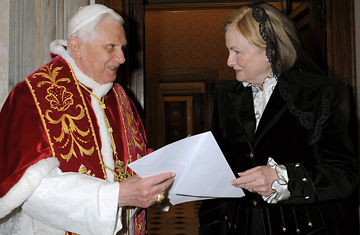
Pope Benedict XVI meets U.S. Ambassador to the Holy See Mary Ann Glendon during a private audience at the Vatican on February 29, 2008.
You never know what to expect when Karl Rove calls. But when the phone rang for Mary Ann Glendon last summer, Rove, still President Bush's top adviser at the time, had a holy mission for her: Ambassador to the Vatican. Now, having just landed in Rome, she has one of the biggest tasks of that mission already waiting on her desk: coordinating Benedict XVI's first papal visit next month to the United States. "It's a great moment to arrive here," Glendon says of her assignment to the Holy See. "[The trip] will be interesting... Be prepared to be surprised."
Moving from a Harvard Law School lecture hall to the U.S. Embassy at the Vatican might seem to require a major leap of faith. But Glendon, considered one of the top American Catholic thinkers of her generation, has long been at home along the banks of both the Charles and Tiber rivers. Officially installed on Feb. 29 as the new American Ambassador to the Holy See, she is a longtime Harvard Law professor, author and international expert on human rights and legal theory. But her resume also includes stints as a visiting lecturer at the Gregorian Pontifical University in Rome and three years as the President of the Pontifical Academy of Social Sciences, the first woman to hold such a prestigious academic post at the Vatican.
President Bush's choice of the 69-year-old registered independent as his top envoy at Catholic Church headquarters — following a pair of prominent Republican fund raisers in the post — is a clear nod to the cerebral leanings of the man in charge of the Holy See. Pope Benedict XVI's nearly three-year reign has been marked by his intellectual explorations and probing writings about how a timeless faith intersects with contemporary life.
During an exclusive interview with TIME, at her embassy office overlooking Rome's ancient Circus Maximus, Glendon said she hopes to offer lucid analysis for Foggy Bottom about just how the deep thoughts of the "Professor Pontiff" might influence public policy. One example was Benedict's provocative 2006 discourse about religion and violence in Regensberg, Germany, which initially angered many Muslims but has also helped recast the worldwide "Clash of Civilizations" debate. "One of his central preoccupations has always been about reconciling faith and reason," Glendon said of the Pope. "He wants to know how religions can come to terms with the enlightenment."
However, Glendon's first major piece of business requires the nuts-and-bolts diplomacy. On April 15, Benedict sets off on his first papal trip to the United States, a six-day visit to Washington, D.C., and New York City that will include stops at the White House, Ground Zero, the United Nations and an open-air mass at Yankee Stadium.
While arranging the itinerary will be complex enough, there is also the matter of dealing with the Pontiff's philosophical fascination with America. Glendon said the Pope is "intrigued" by the U.S. model for managing the church-state divide, which contrasts with the contemporary European tendency to avoid public professions of faith. "We are a nation that has traditionally valued the role of faith in sustaining the democratic experiment," she said. "Culture comes before politics... and religion is at the heart of culture." Though the Vatican was staunchly opposed to the war in Iraq, Glendon arrives largely after the fact, as both sides are focused on rebuilding the fractured country. She says that the German Pope and American President, who visited the Vatican last year, "seem to have formed a good friendly relationship."
Herself the author of books on family law, comparative legal traditions and Eleanor Roosevelt, Glendon says that like many Catholic academics she's long followed the writings of the man formerly known as Professor Ratzinger. "He speaks frankly to the deep-seated needs and desires of modern and postmodern men and women," she says. "He's not afraid of confronting the questions that people ask themselves in the middle of the night."
Staunchly pro-life, Glendon was the first woman to lead a Vatican delegation to a major U.N. conference after Pope John Paul II appointed her head of the Vatican delegation to the 1995 U.N. Conference on Women in Beijing. The Church's stance on reproductive policy has been criticized for its absolute ban on condoms, even in its missionary work with AIDS victims. The mother of three insists that she's a committed feminist, "If you let me define the term." She says she is focused on issues that are "of particular interest to women and that wouldn't be heard if women didn't draw attention to them." She says that two of her biggest concerns are finding solutions for working mothers and worldwide poverty, which "has a feminine face."
"Feminism, like everything, has a history and goes through stages. What's foremost on minds of not only young women, but also men, is how to have a satisfying work life without sacrificing family life," she said. "Feminism will take a new form. It will be different, but we don't know how because there's no road map from previous generations."
Glendon says that Rove's call last summer was a "total surprise" but she didn't even need a moment to mull the offer of the ambassadorship. "Why sure, I'd love to do that!," she recalled, with a hearty laugh, was her instant response to Rove. Becoming the leading American government representative at the Vatican has required Glendon to give up her post at the Pontifical academy. She denied there was any conflict of interest in having served the Vatican in the past. "Like others I have done volunteer work for the Church; mine has been as an academic," Glendon said. "I understand my role. I took my oath." And, we can safely assume, she's said her prayers too.
